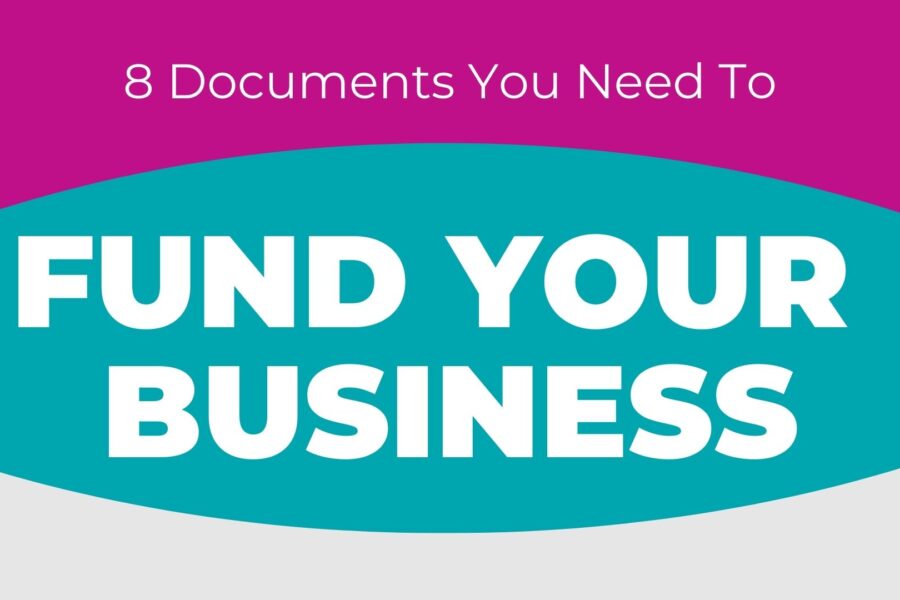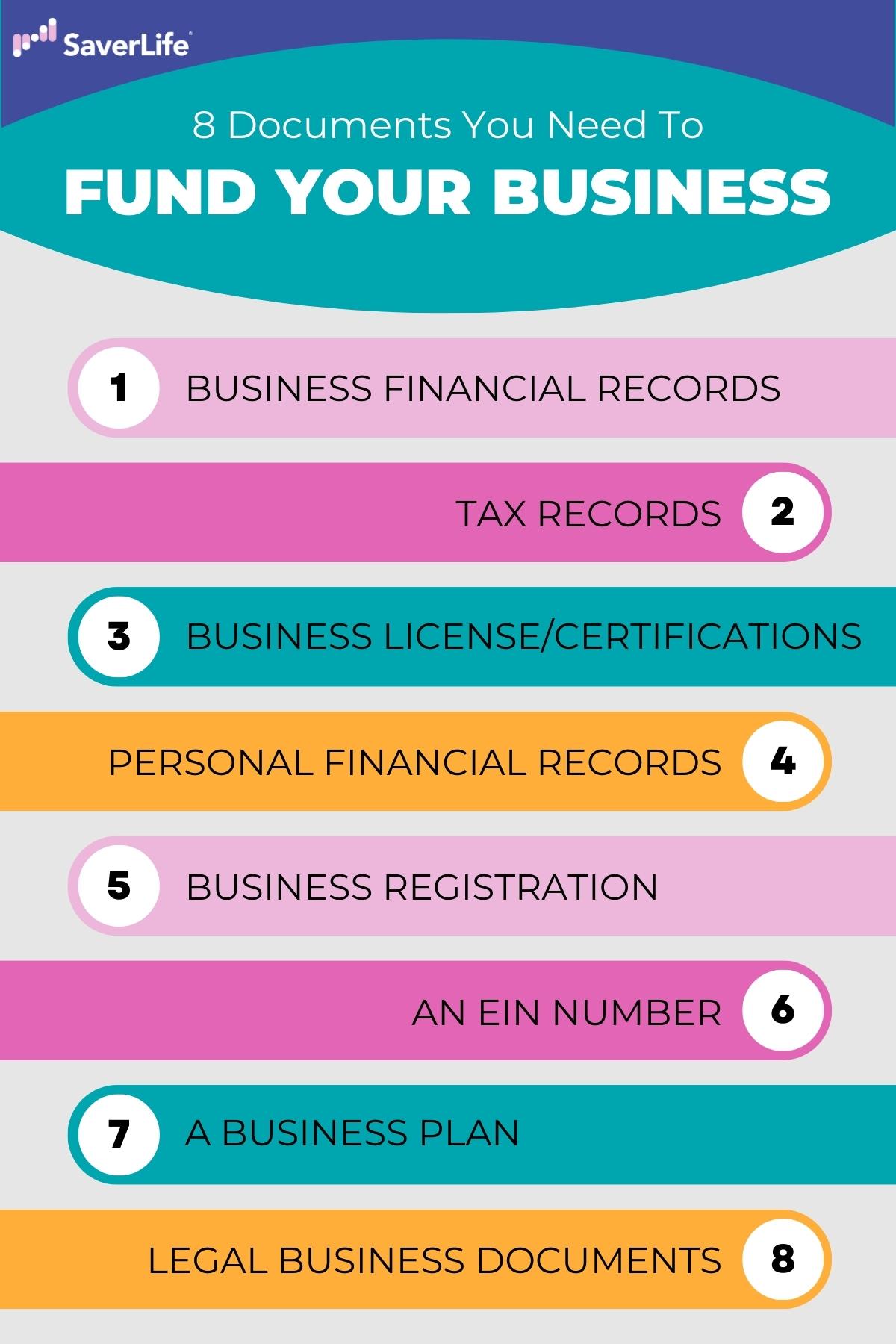
Whether you’re starting a small business or trying to grow one you’ve already built, you may need outside funding. The prospect of applying for funding can be intimidating, but we’ve got you! The first step is simply preparing all your documents and records.
While some lenders may require additional information and documentation, this article will walk you through the 8 documents you need to get financing for your small business. This will help you be more prepared when it’s time to speak with lenders.

1) Business Financial Records
Most lenders will want to see your business bank statements for the past three months and a copy of your business credit report. They’ll also want to see a few business financial statements for the last year of business.
Balance Sheet
A business balance sheet is a snapshot of your business finances at one point in time (year end, year to date, previous fiscal year, etc.). It compares your assets, or what the business owns, to your liabilities, or what the business owes.
This helps the lender analyze the financial performance of your business. It also lets them calculate some ratios like your debt-to-income ratio and your accounts receivable ratio. This can help the bank get an understanding of the possible risks of lending to you.
Cash Flow Statement
A cash flow statement shows how cash flows in and out of your business over a particular period. Lenders will typically want to see a cash flow statement for the past year.
The main thing a cash flow statement compares is the revenue earned by the business to the expenses paid out by the business.
This can help a lender understand if you are making a profit. It can also give them a sense of your ability to pay back your debts.
2) Tax Records
For your business, the lender will typically want to see income tax returns for the previous three years. But don’t panic if your business is just starting out.
Ask your lender if it’s ok to have an accountant create a projected tax return. This will allow you to demonstrate what the business expects to do tax-wise.
Often lenders will want to see your personal income tax returns for the last three years as well.
3) Business License(s) or Certifications
Business lenders want to be sure they’re investing in sound businesses that can repay their loans. This means they want their borrowers to be up to date in their industries. If your business or industry requires a business license or any certifications, have copies of these to give to your lender.
4) Personal Financial Records
While it might seem strange, when you apply for financing for your small business, the lender will likely ask to see personal financial records. In fact, some small business loan programs require owners with an ownership interest of 20% or more to provide their personal financial records for review. This helps the lender assess not just the risk of lending to the business but also the risk of lending to the individuals behind the business.
Often, loan programs require one year of personal financial records to be supplied. The statements you might need to include for your personal finances are like those you include for the business finances.
You may be asked for personal bank statements or a personal credit report. You also might need to supply a personal balance sheet. This compares your personal assets to liabilities. It can help a lender determine your net worth. Additionally, you may need to provide a personal cash flow statement. This will show how money flows in and out of your personal accounts over a set period.
5) Business Registration
Your business registration shows the lender that you’re a legal business and have taken the necessary steps to operate legally in your community and your field. You can demonstrate your business registration using the following documents:
- Business license
- Articles of Incorporation
- Partnership Agreement
When applying for small business financing, be sure to understand what forms of business registration your lender would like to see.
6) An EIN Number
An EIN number is a federal tax identification number issued to your business for tax purposes. You’ll also use your EIN to open a business bank account, file federal taxes, hire employees, and apply for a business license.
Having an EIN number helps your lender verify that you’re a legitimate business and that you have the right to sign legal documents or write checks as the owner of the business.
If you don’t have an EIN Number, you can apply for one for free through the IRS website.
7) A Business Plan
Providing a business plan to your lender gives them a good idea of where you’re taking your business and how you will use the funds they lend you. It also demonstrates to them that you are organized and are working to grow your business.
When you submit your business plan, be sure to include projected financial statements (profit and loss, cash flow, and balance sheet). This will help the lender understand how you’ll use the funds. It can also help them understand your ability to pay back the loan.
8) Other Legal Business Documents
In some cases, lenders may require additional documentation to secure a loan. The additional business documents they might need you to provide can include:
- Articles of Incorporation
- A Lease or rental agreement for any property or equipment you rent that is integral to your business
- Franchise agreements
- Copies of contracts you have with third parties
One thing you can do to help yourself before you need to get financing for your business is to keep your business documents organized and easily accessible. This will help you feel confident when looking for financing because you know where everything is and don’t have to waste time hunting it down.
Putting It All Together
Now that you have an idea of what documents you might need to get financing for your small business, let’s put it all together.
The first thing you’ll want to do is stay organized. This can help you eliminate stress from the process because you’ll know where your information is. Put together a business documents folder on your desktop to keep your digital files in. For any hard copies you might have, create a folder or a file cabinet to keep them organized.
These documents are a good starting point to gather before you look for business financing.
Having them handy will help you prepare for the meeting and might also speed up securing funds.
As you look for financing, remember to read all business loan documents carefully. Be sure you understand the terms and conditions, know the interest rate, understand any loan origination fees, and are clear on the repayment schedule.
Taking out a loan to start or grow your small business can feel stressful. Taking the time to gather these 8 documents prior to speaking with lenders can help you feel confident and prepared. It can also give you a good idea of where your business stands financially.


